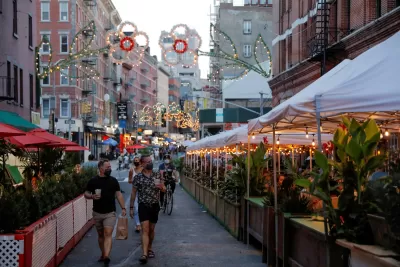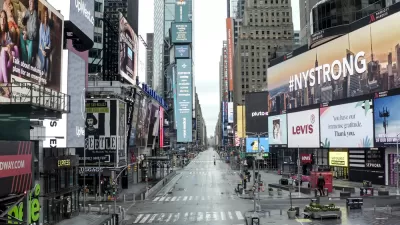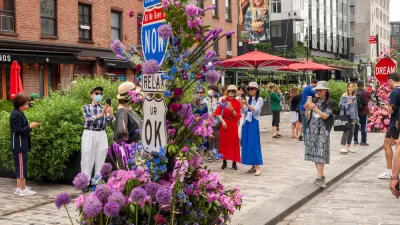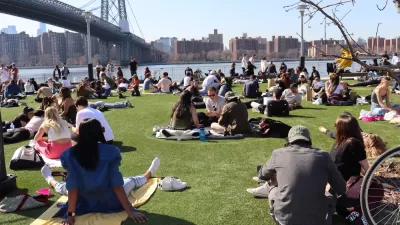At the onset of the pandemic, certain media figures were quick to jump on the bandwagon of anti-urbanism. While many of the anti-urban predictions failed to come about—neither did the problems of cities disappear.

Emily Badger writes to evaluate the lessons from one of the pandemic's most persistent and frequently fraught debates: Will the Covid 19 pandemic destroy the urban way of living in the United States?
From the outset of the pandemic, many took to the pages of mainstream media and social media to cast blame and predict dire consequences. "The pandemic promised nothing short of the End of Cities, a prophecy foretold by pundits, tweets and headlines, at times with unveiled schadenfreude," writes Badger.
Planetizen scrambled to keep up with the narrative at the beginning of the pandemic, gathering the discussion of pandemic planning and the consequences of Covid-19 for cities in a regular compendium. The discussion about the "End of Cities" frequently found its ways into our headlines.
- Debating the Future of Cities, and Urban Density, After the Pandemic (March 2020)
- Density Debate Rages Alongside the Pandemic (April 2020)
- The Media Can't Stop Talking About the End of Cities (September 2020)
Why was this prediction so alluring, asks Badger? To get at an answer, Badger and the team at The Upshot asked more than a dozen historians, economists, sociologists and urban policy experts about the staying power of the End of Cities narrative and about the "deep-rooted discomfort — suspicion, even — about urban life in America."
Experts cited in the story include:
- Eric Klinenberg, a sociologist at N.Y.U.
- David Schleicher, a Yale Law School professor
- David Madden, a sociologist at the London School of Economics
- Sara Jensen Carr, a professor of architecture, urbanism and landscape at Northeastern University
- Jason Barr, an economist at Rutgers
- David Albouy, an economist at the University of Illinois at Urbana-Champaign
One of the respondents say anti-urbanism is an American religion. Another says urban residents who left the city turned their story into a self-fulfilling prophecy. "'Cities are over,' in other words, is a convenient conclusion if you have decided they are over for you," writes Badger.
Importantly, Badger includes the insight of Madden, who points out that even urban boosters are making similar mistakes of bias.
"'The opposite of the decline narrative is a kind of urban boosterism which holds that after the pandemic, the dominant urban growth model of the past 15 years or so can continue, with a few tweaks here or there,' wrote Professor Madden, at the London School of Economics. That would be mistaken, too…"
All the pre-existing problems of expensive, unequal cities remain, and many have been exacerbated in ways that have not yet become apparent.
"In the end, the challenges of cities will persist, just as cities themselves will. And it seems to be folly to imagine away either," writes Badger.
FULL STORY: Covid Didn’t Kill Cities. Why Was That Prophecy So Alluring?

Alabama: Trump Terminates Settlements for Black Communities Harmed By Raw Sewage
Trump deemed the landmark civil rights agreement “illegal DEI and environmental justice policy.”

Study: Maui’s Plan to Convert Vacation Rentals to Long-Term Housing Could Cause Nearly $1 Billion Economic Loss
The plan would reduce visitor accommodation by 25% resulting in 1,900 jobs lost.

Planetizen Federal Action Tracker
A weekly monitor of how Trump’s orders and actions are impacting planners and planning in America.

Wind Energy on the Rise Despite Federal Policy Reversal
The Trump administration is revoking federal support for renewable energy, but demand for new projects continues unabated.

Passengers Flock to Caltrain After Electrification
The new electric trains are running faster and more reliably, leading to strong ridership growth on the Bay Area rail system.

Texas Churches Rally Behind ‘Yes in God’s Back Yard’ Legislation
Religious leaders want the state to reduce zoning regulations to streamline leasing church-owned land to housing developers.
Urban Design for Planners 1: Software Tools
This six-course series explores essential urban design concepts using open source software and equips planners with the tools they need to participate fully in the urban design process.
Planning for Universal Design
Learn the tools for implementing Universal Design in planning regulations.
Caltrans
Smith Gee Studio
Institute for Housing and Urban Development Studies (IHS)
City of Grandview
Harvard GSD Executive Education
Toledo-Lucas County Plan Commissions
Salt Lake City
NYU Wagner Graduate School of Public Service





























